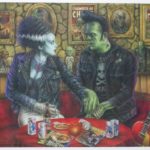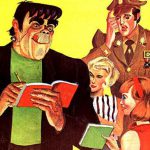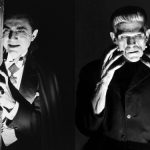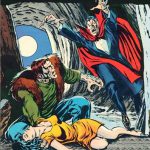The concept of the ‘mad scientist’ creating a creature/monster/weapon that eventually falls out of his control, leading to the scientist’s eventual defeat or ruin, is a common narrative trope in science-fiction / horror tales. For example, Robert Louis Stevenson’s The Strange Case of Dr. Jekyll and Mr. Hyde also features a scientist destroyed by a creature of his own making (although the circumstances are, of course, quite different).
Science fiction author Isaac Asimov coined the term Frankenstein complex for the fear of robots.
Frankenstein or Franken– is sometimes used for nuancing artificial monstrosity as in “frankenfood”, a politically charged name of genetically manipulated foodstuff. The Franken- prefix can also mean anything assembled haphazardly from originally disparate elements. Especially if those parts were previously discarded by others, for example, a car built from parts salvaged from many other cars. Similarly, for many years Eddie Van Halen played a guitar built in such a manner which he called the “Frankenstrat”.
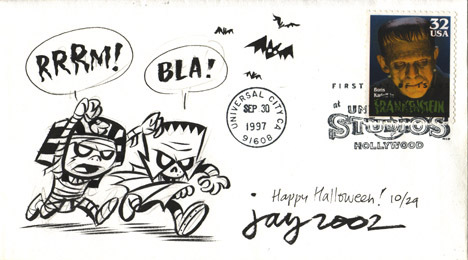
In 1971, General Mills introduced “Franken Berry“, a strawberry-flavored corn cereal whose mascot is a variation of the Monster from the 1931 movie.
“Frankenstein” is the name of a character in the 1975 movie Death Race 2000 and its 2008 remake Death Race. The first incarnation was portrayed by recently deceased veteran actor David Carradine and the second by Jason Statham.
George A. Romero’s 1985 film Day of the Dead features a scientist conducting experiments on zombies nicknamed “Frankenstein.”
The hit song China in Your Hand by the British rock band T’Pau employs the story of Frankenstein, and Mary Shelley’s writing of it, in its role as a classic cautionary tale.
In David Brin’s science fiction novel Kiln People, defective golems that become autonomous are called “frankies”.
The Incredible Hulk, the title character of a popular comic book series, was partially inspired by Frankenstein. He not only looks much like the typical version of Frankenstein’s monster, but in the most enduring of different versions can acts in a similarly brutish, volatile manner yet still be a gentle being who wishes to be left alone.
Frankenstein might have been the inspiration for the Pokémon Mewtwo as both were created by humans as experiments and both turn on their creators
DC Comics, have a similar character to Marvel Comics’ Hulk called Solomon Grundy and resembles Frankenstein’s monster in appearance and also in its child mind-like state while retaining its ability to become enraged. Grundy also possesses great strength.
Cavewoman: Pangean Sea #7 had Cavewoman battling Frankenstein’s monster atop a castle. Cavewoman has also has numerous pin-ups featuring her along with Frankenstein’s monster and/or other Universal Monsters.
In 2006, the book The 101 Most Influential People Who Never Lived listed Dr. Frankenstein’s Monster (sic) at #6.[13][14]
DC Comics had a character called “Young Frankenstein” appear in an issue of Teen Titans, who was inspired by the Mel Brooks film Young Frankenstein (1974).

